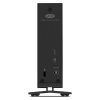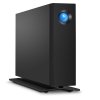You are automating your backup system. Since I have a small amount of data that need to be protected, I manage the backing up manually.
RAID duplicates your back up, thereby reducing the chances of failure. I duplicate my backup manually every week on different drives, or even on the same drive using a crude incremental back up methodology - this week - last week, or, current-previous.
We are both doing the same - reducing failure rates.
All I am saying is that using HDD is not as dangerous as it is made out to be. With the right amount SOP for their usage, they can work for you quite well.
RAID duplicates your back up, thereby reducing the chances of failure. I duplicate my backup manually every week on different drives, or even on the same drive using a crude incremental back up methodology - this week - last week, or, current-previous.
We are both doing the same - reducing failure rates.
All I am saying is that using HDD is not as dangerous as it is made out to be. With the right amount SOP for their usage, they can work for you quite well.




